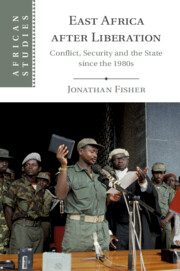Crossref Citations
This Book has been
cited by the following publications. This list is generated based on data provided by Crossref.
Day, Christopher
Khisa, Moses
and
Reno, William
2020.
Revisiting the Civil-Military Conundrum in Africa.
Civil Wars,
Vol. 22,
Issue. 2-3,
p.
156.
Østebø, Terje
2020.
Islam, Ethnicity, and Conflict in Ethiopia.
Khisa, Moses
and
Day, Christopher
2020.
Reconceptualising Civil-Military Relations in Africa.
Civil Wars,
Vol. 22,
Issue. 2-3,
p.
174.
2021.
Race and Diplomacy in Zimbabwe.
p.
346.
Pailey, Robtel Neajai
2021.
Development, (Dual) Citizenship and Its Discontents in Africa.
Duursma, Allard
and
Tamm, Henning
2021.
Mutual Interventions in Africa.
International Studies Quarterly,
Vol. 65,
Issue. 4,
p.
1077.
2021.
Revolutionary State-Making in Dar es Salaam.
p.
330.
Verhoeven, Harry
2021.
The party and the gun: African liberation, Asian comrades and socialist political technologies.
Third World Quarterly,
Vol. 42,
Issue. 3,
p.
560.
Purdeková, Andrea
and
Mwambari, David
2022.
Post-genocide identity politics and colonial durabilities in Rwanda.
Critical African Studies,
Vol. 14,
Issue. 1,
p.
19.
Makahamadze, Tompson
and
Fikade, Muluken
2022.
Popular protests in the Amhara region and political reforms in Ethiopia, 2016–2018.
Journal of Eastern African Studies,
Vol. 16,
Issue. 1,
p.
115.
Dye, Barnaby Joseph
2022.
Introduction: The ideology of the illiberal modernisers in Africa.
Critical African Studies,
Vol. 14,
Issue. 3,
p.
219.
Bareebe, Gerald
and
Khisa, Moses
2023.
Rwanda-Uganda relations: elites’ attitudes and perceptions in interstate relations.
Commonwealth & Comparative Politics,
Vol. 61,
Issue. 2,
p.
152.
Ashley, Sean Paul
2024.
Comrades in Arms? Rebel Leadership Roles and Coups in Rebel Regimes.
International Studies Quarterly,
Vol. 68,
Issue. 2,
2024.
Black Soldiers in the Rhodesian Army.
p.
283.
Kasfir, Nelson
2024.
Legacies of Victors’ Rebel Governance.
Civil Wars,
p.
1.
Dirkx, Toon
2024.
The Clashing Legacies of EPLF Rebel Governance in Post-Independent Eritrea.
Civil Wars,
p.
1.
Asmare Aragaw, Belay
2024.
Conflict resolution from below: The case of local peace committees in North Wollo Zone, Amhara Region, Ethiopia.
African Security Review,
Vol. 33,
Issue. 1,
p.
98.
Simpson, Mark
2024.
Donors, Democracy and Development in Africa.
p.
91.



